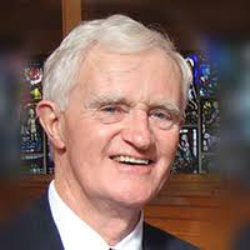Eric Hodgens. Sydney's next bishop - what sort?
March 10, 2014
What should we look for in a bishop for Sydney in these changing times?
A Christian.
One committed to Jesus message of love, forgiveness and compassion. One who holds that the Church is not just the hierarchy, but the People of God on a journey.
A citizen of the world.
One who, while suspicious of all isms including secularism and pluralism, loves the worlds secularity and plurality. One who sees this non-confessional culture as an ideal setting for proclaiming a message of hope and salvation amid the reality of sadness, loss, sickness, poverty and death. One who wants the believers response to be free, not enforced by state or tribe.
A believer.
Ideologues subscribe to platforms. Believers commit themselves to movements. Sydney needs a believer, not an ideologue. Ideologues have closed minds. Believers are self-critical and open to discussion - even change of mind. Ideologues like things to remain the same. Believers stay in contact with contemporary culture and know that all things are changing. As the cultural context changes they must recontextualize or die. They change their habits to maximise values.
Ideology has shouldered out faith over the last 35 years. Personal morality, especially sexual, has eclipsed the central Christian message. The John Paul II Institute for Marriage and The Family is an offspring of this trend. Its objective is to push the recent Vatican line on sexual morality, especially the lost cause of contraception. It is in this institute that Anthony Fisher, now Bishop of Parramatta, raised his profile to the delight of Cardinal Pell.
A Leader.
Leaders are able to formulate a practical vision of how best to implement a groups goals in the setting of contemporary reality. They can persuasively communicate that vision to their followers. They can organise and make the right choices to staff that organization and implement the vision. Leaders identify and prioritise the issues they pursue in the public forum. They argue big issues effectively so that they appear as men of principle and strength.
An educator.
An educator is able to use his own rhetoric to educate his hearers.
He also supports the Catholic Education system and can choose the right persons to lead it. He supports education in faith within that system. He ensures that the belief exemplified by Vatican II imbues that education. He ensures that publications used in that education are similarly imbued.
He ensures that faith education specialists in Catholic schools get good formation and are given Positions of Responsibility within the system.
Brains and an awareness of history.
There is no substitute for brains. Add historical awareness and you have covered a key pre-requisite for leadership.
Anti-clerical-ism.
Clericalism is Christianitys curse. All who belong to the Church are equally baptised; all are entitled to be a drawn on for the Churchs mission, organization and leadership. A good bishop realises that both lay and ordained leadership is necessary and organizes formation and appointments accordingly.
Clericalism is the cornerstone of the paedophilia crisis. Clerical power aided the offenders. Clericalism prompted the cover up by the bishops. Clericalism leads to corruption. It is endemic to the organizational structure of the Church.
Any priest or bishop involved in this cover up should be excluded from consideration.
An administrator.
The candidate must be a good administrator if he is to be effective.
Application.
Vatican II in the 1960s started a renewal. It embraced the modern world. Against a policy of centuries it turned its back on the confessional state and backed freedom of religion. It exchanged the imposition of imposed doctrine for freer enquiry.
The 80s, 90s and 00s opted for reverse under the leadership of John Paul and Benedict. This reverse was institutionally implemented by the appointment of conformist bishops.
Now Pope Franciss fresh breeze is encouraging a resumption of renewal. Ideology is to give way to true belief. It is time to move out, not turn in. This questions the practice of promoting existing bishops. Some are changing their spots in the new policy climate - making one suspicious.
Pope Francis spoke to the members of the Congregation for Bishops at the end of February. He gave them the criteria he wanted them to use as they went about the selection of bishops. This is his wish list:
- People with Gods breadth of heart (Yes, that is the term he used);
- who can speak clearly asserting the human rights of the powerless and abandoned without fear or favour;
- who are witnesses to the Risen Christ in the modern world;
- Ready for renunciation and sacrifice;
- Capable of healthy relationships with both men and women;
- Culturally at home in todays world;
- who can effectively proclaim the message of Jesus;
- Good pastors:
- Not princes;
- Not ambitious careerists (a mentality he likened to adultery).
The last two popes had different priorities. Bill Morris is a good example of a bishop who fits Francis criteria, but in 2011 he was removed from Toowoomba by Benedict.
The pope knows good bishops are hard to find. The pool of priests is very shallow. Recruitment dropped to an unsustainable level 45 years ago - a long lead time. Maybe its time for a lateral move. Pick a suitable layman and ordain him immediately. They did that with Ambrose in Milan in 374 A.D. That hurdle jumped, we may be ready for the next hurdle suitable women.
Citing Samuel in the quest for a king for Israel he told the Congregation for Bishops to seek the ideal candidate out, as Samuel did David; send for him if he is hidden away. Samuel said we will not sit down till he arrives. Lets hope we are not left standing for too long.
Eric Hodgens is a retired Catholic priest who ‘writes a bit’.
